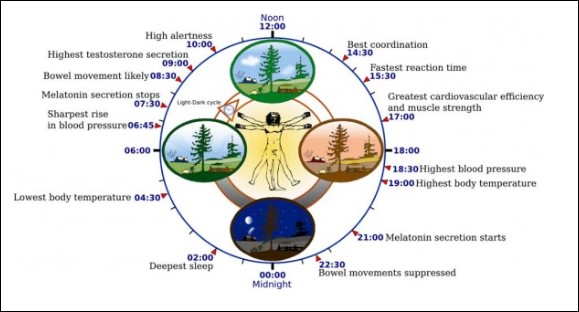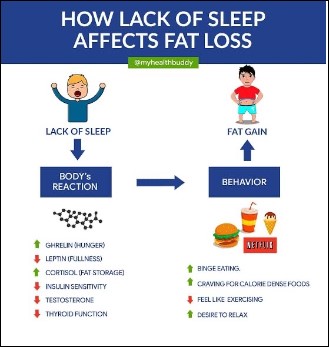
Weight loss and proper sleep go simultaneously. This statement has a scientific basis. Researchers, globally and from time to time, through the practicality of applied theories, have proven this. Lack of quality sleep can hamper weight loss and progress over time. Researchers globally, from time to time, have proven this via scientific studies and the practicality of applied theories. (Refer to Study H)
National Sleep Foundation recommends 7-9 hours of sleep for adults, which can affect weight loss progress.
In this article, we discuss how important sufficient sleep is for appetite regulation and keeping excess weight away. Here are some effects of sleep deprivation that can lead to obesity :
( A) Disruption of Circadian Rhythm
Before we start, let’s talk about circadian rhythm, a sleep-wake pattern over a 24- hour day.
Circadian rhythm is influenced by light and dark, as well as other factors such as poor sleep habits, stress, depression, late-night eating, and exposure to blue light ( phones and tv) late at night, which further results in an imbalance of hormones, insulin regulation, obesity, and mental health conditions.
Short-term disruptions to our circadian rhythm may result in
- memory issues
- lack of energy
- delayed wound healing
- changes to the hormone cycle that may impact fertility
- problems with digestion and bowels
- shifts in your body temperature.
The Mismatch of circadian rhythm messes up metabolism and calorie consumption, making it more difficult to lose weight. (Refer to Study G)

Image credit: Wikimedia Commons
(B) Increase in Ghrelin
Ghrelin, also known as the “hunger hormone”, is produced in the stomach, increasing the drive to eat.
When we are sleep deprived, ghrelin levels significantly increase, making us feel hungry even after having an adequate diet, leading to the intake of surplus calories
A single night of sleep deprivation increased Ghrelin levels by over 15% ( Refer to Study A )
A sufficient amount of sleep ensures a lower level of ghrelin, i.e. less drive to binge eat.
(C) Decrease in Leptin
Leptin is a hormone that triggers the part of the brain (ventromedial hypothalamus) that tells us that we are full and don’t need food anymore (feeling of being satiated).
It is released by adipose (white) fat cells and is triggered by high sugar levels in the blood (insulin) and emotional stress.
A single night of sleep deprivation decreased leptin levels by over 18%( Refer to Study A ).
So, if we don’t sleep properly, our leptin levels drop, and our brain interprets it as a ‘starvation and less expenditure of energy’ signal, triggering more calorie intake and less inclination to move, leading to weight gain.

(D) Cortisol levels Increase
Cortisol is a stress hormone responsible for triggering fight and flight response. Cortisol levels are at their peak in the morning, around 9 am.
Poor quality sleep, or rather an insufficient amount of sleep, increases cortisol levels.
When cortisol is elevated too frequently and over long periods, it can cause several health problems, such as :
- High blood pressure
- Diabetes,
- Weight gain (by stimulating appetite and by encouraging the body to store fat more aggressively)
- Problems with digestion,
- Memory problems,
- Increased inflammation and
- Greater vulnerability to illness.
(E) Decrease in Insulin Sensitivity
Poor sleep changes how the body produces and uses insulin. The pancreas produces insulin that enables cells in muscles and tissues of the body to absorb glucose from the bloodstream for energy. In this manner, insulin regulates blood sugar helping maintain glucose homeostasis that is neither too high (hyperglycemia) nor too low (hypoglycemia).
Due to insufficient or poor quality sleep, cells can become resistant to insulin and be less able to absorb glucose from the blood, which further leads to persistently high levels of glucose (i.e., sugar) in the blood—which, in turn, triggers the body to increase insulin production, the reason being high blood sugar. Sometimes, the body underproduces insulin, resulting in high blood sugar.
Over time, this dynamic of high blood sugar and insulin resistance (or lack of sufficient insulin production) can lead to the development of type 2 diabetes. (Refer to Study E)
(F) Decrease Testosterone
It’s an anabolic hormone responsible for muscle growth. A decrease in testosterone means the body has an increased tendency to store fat (Refer to Study C). Low testosterone levels reduce muscle mass and calorie expenditure. These levels rise during sleep and decrease during waking hours. Research has shown that the highest testosterone levels happen during deep restorative sleep, primarily late in the nightly sleep cycle.
Poor Sleep—>Decreases testosterone—>reduces muscle mass—> Increases fat storage—>less calorie expenditure—> weight gain
(G) Inhibits thyroid Function
The thyroid is a butterfly-shaped endocrine gland(which makes hormones) in our neck, just above the collarbone. Thyroid hormones control the rate of many activities in our bodies. These include how fast we burn calories and how quickly our heartbeats. All of these activities are our body’s metabolism.
“Thyroid is a master regulator of our metabolism and determines how much calories we would
be burning.” (Refer study D)
Insufficient amount of sleep directly correlates to thyroid function. Hyperthyroidism (increased production of thyroid hormone) can cause or worsen other conditions such as anxiety or depression, which in turn can further impair sleep and insomnia.
(H) Impaired Immune system
The immune system is a network of biological processes which defend the body against foreign invasions( bacteria, viruses, parasites and fungi)
Lack of sleep causes poor rest, recovery and repair of cells which leads to weakened immunity over time. Amongst the wide-ranging effect of sleep deprivation, disrupting the immune system tops the chart. Lack of sleep compromises the body’s ability to fight off not only infections but heart diseases too.
(I) Depression and anxiety :
All the feel-good hormones/neurotransmitters which regulate our mood are produced while sleeping.
The majority of evidence suggests the relationship between sleep problems and anxiety and depression is strong and goes both ways, which means sleep problems can lead to anxiety and depression, and vice versa. ( Refer to Study F) For example, worrying and feeling tense during bedtime can make it difficult to fall asleep, but having trouble falling asleep, and in turn not getting enough sleep, can also result in more anxiety.
And when the above physiological changes happen after poor sleep, we crave calorie-dense foods, indulge in snacking, tend to miss our workouts and move less, leading to obesity.
We know there could be several justified reasons for not being able to sleep on time like there must be work-related problems, and sometimes a young child needs help with school projects. At times it is a Friday night or a night out with friends. Sometimes there is shift work or a job that doesn’t let us sleep. Still, once we understand and ponder over the problems that we are going to suffer due to sleep-deprived days, sleep is going to be our priority and thus, we can create a fantastic, healthy body that not only going to enhance our work productivity but also keeps us in shape, keeping several diseases at bay.
By adopting specific lifestyle changes mentioned below, we can maintain a healthy nighttime sleep regimen
- Maintain a sleep routine. Our brain doesn’t know it’s the weekend. Don’t disrupt the circadian rhythm too much over the weekend by sleeping late and watching Netflix series.
- Avoid scrolling on social media apps at bedtime. The likes and comments on the posts affect the brain’s reward centres releasing Dopamine, keeping us active and disrupting sleep.
- Keeping our room temperature comfortably low (24 to 26 degrees) has been shown to aid sleep quality.
- Avoid coffee from the evening onwards, as caffeine is a stimulant and can affect sleep.
- Avoid mobile, Tablets and TV screens during bedtime. Exposure to blue wavelength or bright broad-spectrum light leads to immediate increases in simple alertness and attention
( Refer to Study I)
- People dealing with irregular sleep patterns due to anxiety and stress can incorporate meditation into their routines. Researches show that meditation is an effective treatment for anxiety, and it does not suffer from any side effects. It may also function as preventive medicine. ( Refer to Study J)
References :
- https://www.semanticscholar.org/paper/Brief-communication%3A-Sleep-curtailment-in-healthy-Spiegel-Tasali/f5f985acb717c22b18040131bd3fb3321334430d
- https://annals.org/aim/article-abstract/1379773/impaired-insulin-signaling-human-adipocytes-after-experimental-sleep-restriction-randomized
- https://www.ncbi.nlm.nih.gov/pubmed/17520786
- https://www.ncbi.nlm.nih.gov/pubmed/8827131
- https://www.ncbi.nlm.nih.gov/pubmed/20371664
- https://www.ncbi.nlm.nih.gov/pmc/articles/PMC2862829/
- “Everything to Know About Your Circadian Rhythm Medically reviewed by Nick Villalobos, MD — Written by Natalie Silver
- https://www.ncbi.nlm.nih.gov/pmc/articles/PMC3519150
- https://www.ncbi.nlm.nih.gov/pmc/articles/PMC8032953/
- https://www.ncbi.nlm.nih.gov/pmc/articles/PMC4769029/




